|
|
|
Sort Order |
|
|
|
Items / Page
|
|
|
|
|
|
|
| Srl | Item |
| 1 |
ID:
092988
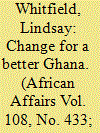

|
|
|
|
|
| Publication |
2009.
|
| Summary/Abstract |
This article analyses the process and outcomes of Ghana's 2008 elections, which saw the National Democratic Congress replace the New Patriotic Party and thus an alternation of ruling party for the second time since (re)democratization in the early 1990s. It argues that Ghana's democratic political system survived the closeness and intensity of the 2008 elections because it has developed stabilizing characteristics: an independent Electoral Commission and transparent electoral processes, integration of the political elite alongside the creation of norms and institutions structuring elite behaviour, and the institutionalization of political parties. The closely competitive elections are the result of a two-party system where voters and political elites are mobilized around two political traditions. These political traditions provide ideological images, founding mythologies and political styles for the parties. Thus, Ghana is different from several African countries where parties split or form around leaders, who bring their popular support base with them. It is also different in that elections are not dominated by ethnic politicization, because the two main parties in Ghana have a strong political support base in most regions and party identification is based on cross-cutting social cleavages of which ethnicity forms only one part.
|
|
|
|
|
|
|
|
|
|
|
|
|
|
|
|
| 2 |
ID:
087046
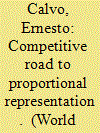

|
|
|
|
|
| Publication |
2009.
|
| Summary/Abstract |
One of the most noteworthy political regularities in the early twentieth century was the shift away from majoritarian electoral rules in Western Europe. The conventional wisdom suggests that proportional representation (pr) was introduced by elites who believed that under the existing majoritarian rules (simple plurality, block-vote, two-ballot rules) they would soon lose power to rapidly growing socialist parties. But this does not explain why many electoral reforms were carried out in countries with weak or nonexistent socialist parties. The author shows that increasing the number of parties distorts the seat-vote properties of electoral rules to a larger degree than previously anticipated. Under increasing party competition, electoral regimes display larger partisan biases than those observed in two-party races and crowd out minority parties that have territorially dispersed constituencies in favor of minority parties that have territorially concentrated constituencies. Using a dynamic Bayesian model for seats and votes, the author measures the partisan biases brought about by the expansion of voting rights in the late nineteenth century to explain the drive to reform majoritarian electoral systems.
|
|
|
|
|
|
|
|
|
|
|
|
|
|
|
|
| 3 |
ID:
100394
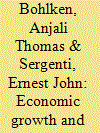

|
|
|
|
|
| Publication |
2010.
|
| Summary/Abstract |
Most studies of Hindu-Muslim riots in India have tended to emphasize the effects of social, cultural, or political factors on the occurrence of ethnic violence. In this article, the authors focus on the relationship between economic conditions and riots. Specifically, this article examines the effect of economic growth on the outbreak of Hindu-Muslim riots in 15 Indian states between 1982 and 1995. Controlling for other factors, the authors find that just a 1% increase in the growth rate decreases the expected number of riots by over 5%. While short-term changes in growth influence the occurrence of riots, this study finds no evidence of a relationship between the levels of wealth in a state and the incidence of ethnic riots. Moreover, by including state fixed effects, the authors determine that the negative relationship found between economic growth and riots is driven primarily by the relationship between growth and riots within a state over time rather than across states. These results are robust to controlling for a number of other factors such as economic inequality, demographic variables, political competition, temporal lags, spillover effects from adjacent states, and year effects. Finally, to address potential concerns that economic growth could be a consequence rather than a cause of violence or that other unobserved factors could confound the relationship between economic growth and the occurrence of Hindu-Muslim riots, the authors also employ instrumental variables (IV) estimation, using percentage change in rainfall as an instrument for growth. The results with IV estimation are similar to the results with non-IV estimation in terms of sign and significance, indicating that the negative effect of economic growth on riots is not due to reverse causality or omitted variables bias.
|
|
|
|
|
|
|
|
|
|
|
|
|
|
|
|
| 4 |
ID:
160630
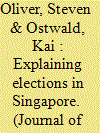

|
|
|
|
|
| Summary/Abstract |
The People's Action Party (PAP) of Singapore is one of the world's longest ruling dominant parties, having won every general election since the country's independence in 1965. Why do Singaporeans consistently vote for the PAP, contrary to the expectations of democratization theories? We argue that valence considerations—specifically, perceptions of party credibility—are the main factor in the voting behavior of Singapore's electorate, and are critical to explaining the PAP's resilience. Furthermore, we argue that the primacy of valence politics arose in part by design, as the PAP has used its control of Singapore's high-capacity state to reshape society and thereby reshape voter preferences towards its comparative advantages. We use a multi-methods approach to substantiate this argument, including a comprehensive quantitative analysis of recent elections. Ultimately, our findings suggest that a focus on valence politics can increase the resilience of dominant parties, but that such a strategy also faces natural limits.
|
|
|
|
|
|
|
|
|
|
|
|
|
|
|
|
| 5 |
ID:
175278


|
|
|
|
|
| Summary/Abstract |
For decades, political scientists have argued that competition is a fundamental component of a responsible party system, such that when one party dominates politics, legislative coalitions destabilize and democratic accountability suffers. In this paper, I evaluate these predictions in an important but largely unexplored legislative environment: American local government. Using an original collection of roll-call records from 151 municipal councils, I show that legislative behavior is more one-dimensional when elections are partisan and the electorate is evenly balanced between the parties. When either of these features is absent, however, elite behavior remains unstructured, with coalitions shifting over time and across issues. These differences across institutional and competitive contexts suggest that partisan elections—and the party organizations that nearly always come with them—are critical for translating electoral insecurity into organized government, raising questions about the capacity for electoral accountability in a growing set of one-party dominant governments across the country.
|
|
|
|
|
|
|
|
|
|
|
|
|
|
|
|
| 6 |
ID:
166645


|
|
|
|
|
| Summary/Abstract |
This paper charts the nature of political cleavage between major parties in post-Arab Spring elections in five Mediterranean region countries, with data from online opt-in surveys. We compare the Moroccan elections, held under a consolidated authoritarian regime, with the transitional cases of Tunisia and Egypt as well as the more mature democracies of Turkey and Israel. Voter opinions are obtained on 30 salient issues, and parties and voters are aligned along two dimensions. We trace country-specific cleavage patterns and reflections of party system maturity in these five countries. The cases of Egypt, Tunisia and Morocco reveal that in less settled cleavage structures there is little congruence between vote propensities for parties and agreement levels with policy positions compared to the more institutionalized democracies of Israel and Turkey where voters exhibit a higher likelihood to vote for a party as the distance between the voter and the party in the policy space gets smaller.
|
|
|
|
|
|
|
|
|
|
|
|
|
|
|
|
| 7 |
ID:
105874
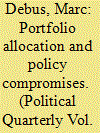

|
|
|
|
|
| Publication |
2011.
|
| Summary/Abstract |
The question of 'who gets what?' is one of the most interesting issues in coalition politics. Research on portfolio allocation has thus far produced some clear-cut empirical findings: coalition parties receive ministerial posts in close proportion to the number of parliamentary seats they win. This article poses two simple questions: Why did the Conservatives and Liberal Democrats agree to form a coalition government and, secondly, did the process of portfolio allocation in the United Kingdom in 2010 reflect standard patterns of cabinet composition in modern democracies? In order to answer these questions, a content analysis of election manifestos is applied in this article in order to estimate the policy positions of the parties represented in the House of Commons. The results show that a coalition between the Tories and Lib Dems was indeed the optimal solution in the British coalition game in 2010. When applying the portfolio allocation model, it turns out that the Conservatives fulfilled the criteria of a 'strong party', implying that the Tories occupied the key position in the coalition game. On account of this pivotal role, they were ultimately able to capture the most important ministries in the new coalition government.
|
|
|
|
|
|
|
|
|
|
|
|
|
|
|
|
| 8 |
ID:
080822
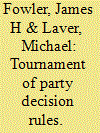

|
|
|
|
|
| Publication |
2008.
|
| Summary/Abstract |
Following Axelrod's tournaments for strategies in the repeat-play prisoner's dilemma, we ran a ``tournament of party decision rules'' in a dynamic agent-based model of party competition. We asked researchers to submit rules for selecting party positions in a two-dimensional policy space, pitting each rule against all others in a suite of long-running simulations. The most successful rule combined a number of striking features: satisficing rather than maximizing in the short run, being ``parasitic'' on choices made by successful rules, and being hardwired not to attack other agents using the same rule. In a second suite of simulations in a more evolutionary setting in which the selection probability of a rule was a function of the previous success of agents using the same rule, the rule winning the original tournament pulled even further ahead of the competition
|
|
|
|
|
|
|
|
|
|
|
|
|
|
|
|
| 9 |
ID:
111500


|
|
|
|
|
| Publication |
2012.
|
| Summary/Abstract |
Parties have an incentive to take up extreme positions in order to achieve policy differentiation and issue ownership, and it would make sense for a party to stress these positions as well. These incentives are not the same for all issues and all parties but may be modified by other strategic conditions: party size, party system size, positional distinctiveness and systemic salience. Using manifesto-based measures of salience and expert assessments of party positions, the findings in this article are that parties emphasise extreme positions if, first, they are relatively small in terms of vote share; second, the extreme position is distinctive from those of other parties; and third, other parties fail to emphasise the issue. These findings have consequences for our understanding of party strategies, party competition and the radicalisation of political debates.
|
|
|
|
|
|
|
|
|
|
|
|
|
|
|
|
|
|
|
|
|